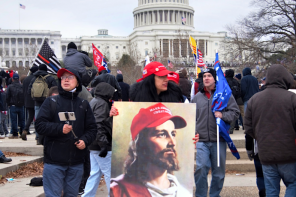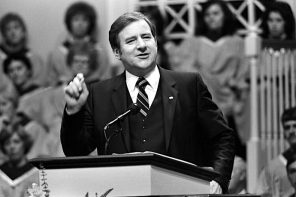Yes, there are times when the wildest idea, the most obviously impossible scheme, becomes so strongly planted in one’s mind that one begins to regard it as something quite realizeable. Moreover, if that thought is combined with a powerful and passionate desire, at certain moments it will loom as something fateful, inevitable, predestined, as something that cannot fail to happen. Perhaps this feeling is due to a combination of premonition, enormous strength of will, and intoxication with one’s own fantasy, or perhaps something else—I don’t know.
—Fyodor Dostoevsky, The Gambler,
Like Dostoevsky, George W. Bush was an inveterate gambler. And while it is a dangerous game to blame all of our current troubles on the grossest gambles of a previous administration, the debts in this case are fairly obvious ones. President Obama, and the nation, now bear the staggering costs of two wars, an ideological commitment to deregulation and an almost staggering faith in the power of free markets.
It is easy to forget the way Bush’s career began. He managed to lose 20 million dollars on the surest of sure things: Texas oil. His father’s friends paid the notes when they came due. So he rolled the dice again, on a long-shot this time, and won big, unseating his well-loved opponent as governor of Texas. And thus was a gambling career born.
Dostoevsky was addicted to gambling; there’s no other word for it. And he knew it. But Dostoevsky had the self-reflection, the psychological acuity, and the religious literacy, to make some sense of the complex attraction of gambling, for stakes large and small. He even wrote a novella—delicious irony that it is, it was written at a blistering pace in order to pay off a debt—that is among the most sophisticated of all modern analyses of the power of gambling across all classes. It bears close reading.
The story evolved slowly in his mind over long years of reflection at the roulette wheel, a game he insisted was tailor made for Russians. In its final form it is a marvelous mingle-mangle of mad passion, deep erotic insight, and a terrifying glimpse into the manifold meanings of money, especially among the elite. This is the world of Bernard Madoff as surely as any.
In one way, the story Dostoevsky tells is almost too predictable. A person who believes herself above the herd mentality of her peers pays a visit to the tables, bets with enthusiastic abandon, and wins a fortune in a fifteen minute spurt of exquisite anti-statistical fury. The next day, she returns to the casino, and loses half her fortune. Her entire estate has been lost by sunset on the third day.
Beneath the surface, however, Dostoevsky the author has been playing a subtly different game. The narrator of the story has long believed that betting with other people’s money is a criminal act that can only end in bankruptcy. That’s what Bush made a career of doing.
But to gamble with one’s own fortune, and under the right circumstances, well, this is how fortunes are made at roulette. Our narrator seems to prove his theoretical intuition when, under a kind of quiet possession, he spends a manic hour at the tables and walks away with nearly as much as his ill-starred companion lost in two days. He has done this with his own small funds; he has also done it for the woman he loves.
But the end is the same. He becomes addicted to the power he believes he has over fate. There is a pattern in seemingly chance events, and the true gambler—if there is such a thing—believes that he or she can discern it, as a feeling. Gambling is mostly an intuition, a kind of faith among those who believe too easily that they have it. That is religious meaning of Dostoevsky’s strange tale.
The sheer power of belief, that delicious feeling of controlling chance itself, overtakes him. He sacrifices everything to that fate—his love, his fortune, much of his life. And that is how he is lost, along with the fortunes that were never really his.
There are rich analogies to be drawn between this wonderful little story and the immediate aftermath of the Bush era.
Dostoevsky plays endlessly on the distinction between two kinds of money-lust: the sort of profit motive capitalism he thinks of as preeminently German, and the no-holds barred running of insane risk he sees as Russian to the core. The narrator tells us pretty clearly which form of madness he prefers, and his own behavior identifies him as a Russian clearly enough.
In the course of history, the ability to accumulate capital has come almost to head the list of virtues required by a man reared in Western civilization. But the Russian is not only incapable of accumulating capital, he is also a persistent and hopeless squanderer. Nonetheless we Russians have a great use for money and so we are always very happy to come across such things as roulette….For my part, I’d rather spend my whole life like a nomad under a tent than worship the German idol. (42-43)
In the nineteenth century, the United States was commonly seen as a wonderful example of German thrift and diligence. We did not take great risks, saved what we earned, paid our debts. In the twentieth century, starting first in the 1920s, we became more Russian in outlook, taking greater risks, running up large debts, spending ourselves into the unseemly position of being the world’s greatest debtor nation. This little story thus take on a sinister meaning, one that puts the period to Bush’s career. It was also hard not to think of this story during President Obama’s recent travels.
Bush had a blind faith in the power of the market. He was so convinced of the surety of stock returns there that he was willing to gamble Social Security on the thing. Thankfully, he was not permitted that one roll of the dice.
Bush had blind faith in the power of his own intuition as well. He almost comically told an eager American public that he had gazed into the eyes of then-President Putin and had seen a man of character, a man whom he could trust.
And on it went. He saw the twin towers fall and blurted out his instinctive cowboy-command: He wanted Osama bin Laden, “dead or alive.” Bin Laden, so far as we know, is still very much alive. Bush saw weapons of mass destruction in Iraq. He saw the power of imposed democracy washing like a wave over the entire Middle East. He saw himself as a man of vision, a figure of great historical moment and a sure-handed gambler with other people’s fortunes.
The market in which he believed so strongly has proven to be far more of roulette wheel than he realized. The Middle East he asserted American military power to transform has indeed been transformed—into a highly unstable zone that now runs from western Pakistan to the Mediterranean Sea. It is as if a blind man were to light a match in the very room where he has been told the TNT is stored. Where we are, right now, and where we are going again, is the hottest nuclear zone on earth: Pakistan, India, China, they all have the bomb.
I do not rehearse all of this as a morality tale; Dostoevsky would have none of that. “Now, whether gain and profit are despicable things is another question. And I am not going to try to answer it here” (29).
I do not say this simply to relive the past either. Just the opposite. I say all of this because it is a cautionary tale for the current president as well, a man who has himself flirted with casinos in the past.
President Obama has surrounded himself with two teams that are cut from the same cloth as their predecessors. The men who helped to create the current financial mess are now hard at work trying to fix it. Their big idea thus far seems to be that we need money, a lot if it, and fast.
The men who gave us Afghanistan, then Iraq, are now the same men who are trying to get us out of Iraq so that we can gamble in Afghanistan with larger stakes. It’s all a bit strange and surreal.
Dostoevsky’s narrator has a keen nose for gambling. He could smell when someone was about to lose their shirt. He refused so much as to set foot in the casino when he sensed that his elderly friend and free thinker was about to cast her whole lot on the roulette wheel. But this keen awareness did not stop him from returning later himself, and meeting the same end.
The way to stop gambling is to return to the semi-sanity of responsible spending and better regulated markets. A little more German Protestantism a little less Orthodox theatricality. The thing to keep in mind is how very far this not-so-simple shift would take us from the situation in which we currently find ourselves. What we have learned in the past year is that our market is itself a kind of roulette wheel, and the croupiers call the game. And no one is immune to that seductive Siren call.




